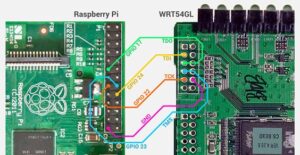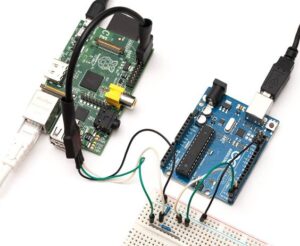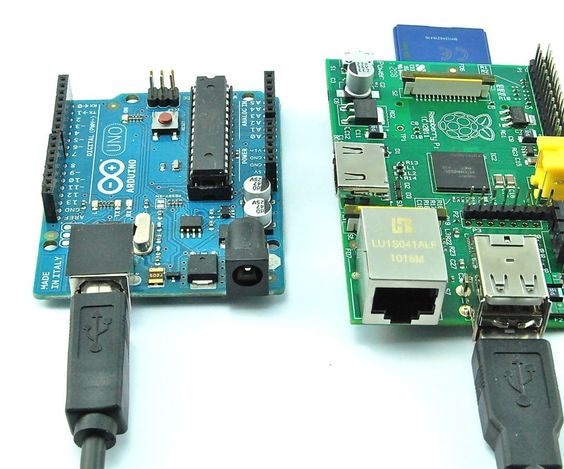Arduino vs Raspberry Pi
The Arduino Uno microcontroller has a small number of I/O pins and is made to be straightforward and user-friendly. In contrast, the Raspberry Pi Zero is equipped with a more potent system-on-a-chip (SoC) that offers more memory, processing power, and I/O pins.
Purpose and Applications
Arduino’s Microcontroller Focus
Arduino is synonymous with microcontroller applications. Its design centers around simplicity and ease of use, making it an ideal choice for projects requiring basic input and output functions.
Raspberry Pi’s Versatility
On the other hand, Raspberry Pi transcends the boundaries of a microcontroller. It functions as a mini-computer, capable of running a full operating system and supporting a range of applications from media centers to web servers.
Hardware Comparison

Arduino vs Raspberry Pi
Arduino’s Simplicity
Arduino’s hardware is straightforward, focusing on specific use cases. It excels in scenarios where simplicity is key, making it a go-to for beginners and those with specific project requirements.
Raspberry Pi’s Advanced Hardware
Raspberry Pi, with its more advanced hardware, can handle complex tasks. Its enhanced processing power and connectivity options make it suitable for a broader range of applications compared to Arduino. Read More: Techrevealz
Programming and Development Environment
Arduino’s Simple IDE
Arduino’s Integrated Development Environment (IDE) is user-friendly, catering to beginners. Its simplified programming language allows for quick prototyping and testing.
Raspberry Pi’s Language Support
Raspberry Pi supports various programming languages, providing flexibility for developers. Python is a popular choice, but users can leverage languages like C++ and Java as well.
Community Support and Resources
Arduino’s Strong Community
Arduino boasts a robust community, particularly beneficial for beginners. The abundance of tutorials, forums, and shared projects makes it easier for enthusiasts to learn and troubleshoot.
Raspberry Pi’s Online Resources
Raspberry Pi users have access to a wealth of online resources, including official documentation, forums, and a vast library of community-created projects. The community’s depth suits those who enjoy exploring more complex concepts.
Cost Considerations
Arduino’s Affordability
For basic projects, Arduino’s affordability is a significant advantage. Its cost-effective nature makes it accessible to a wide audience, especially those new to electronics.
Raspberry Pi’s Value
While Raspberry Pi may have a higher initial cost, its value shines in complex projects. The additional features and computing power justify the investment for those needing a more versatile platform.
User-Friendliness
Arduino’s Plug-and-Play
Arduino’s plug-and-play nature is a blessing for beginners. The straightforward setup allows users to focus on their projects without getting bogged down by technical complexities.
Raspberry Pi’s Learning Curve
Raspberry Pi has a steeper learning curve, but this comes with added flexibility. Users willing to invest time in understanding its capabilities can harness its full potential for diverse applications.
Projects and Use Cases
Showcase of Arduino Projects
Arduino has been the driving force behind numerous successful projects, from simple LED displays to more complex robotics. Its applications span home automation, wearables, and beyond.
Examples of Raspberry Pi Applications
Raspberry Pi finds its place in a multitude of applications, including home media centers, retro gaming consoles, and even small-scale servers. Its versatility opens doors to innovative projects.
Performance and Speed
Arduino’s Real-Time Processing
For real-time processing needs, Arduino excels. Its instant responsiveness is crucial for applications where timing is of the essence, such as robotics and automation.
Raspberry Pi’s Enhanced Performance
Raspberry Pi, with superior processing capabilities, outperforms Arduino in tasks requiring more computational power. This makes it suitable for multimedia applications and other demanding projects.
Security Features
Arduino’s Minimal Security Concerns
Arduino’s simplicity extends to its security features, which are minimal. While suitable for many projects, security-conscious applications might find Raspberry Pi’s built-in features more reassuring.
Raspberry Pi’s Security Measures
Raspberry Pi incorporates security measures that align with its mini-computer functionality. These features make it a preferred choice for projects where data integrity and protection are critical.
Future Developments and Upgrades

Arduino vs Raspberry Pi
Arduino’s Incremental Improvements
Arduino sees incremental improvements with each iteration, maintaining compatibility with older models. This ensures that users can benefit from advancements without rendering their existing projects obsolete.
Raspberry Pi’s Model Updates
Raspberry Pi frequently releases new models with upgraded features. While this provides cutting-edge technology, users need to weigh the benefits against potential compatibility challenges with older projects.
Decision Factors
Choosing the Right Platform
Choosing between Arduino and Raspberry Pi depends on the specific requirements of a project. Beginners might find Arduino’s simplicity appealing, while advanced users may prefer the versatility of Raspberry Pi.
Considerations for Users
Considering factors like ease of use, project complexity, and desired features will guide users to the platform that aligns best with their skills and objectives.
Case Studies
Success Stories with Arduino
Countless success stories showcase Arduino’s role in bringing ideas to fruition. From interactive art installations to home automation, Arduino continues to inspire innovation.
Notable Raspberry Pi Applications
Raspberry Pi has powered diverse projects, including smart mirrors, weather stations, and even low-budget personal computers. Its adaptability opens doors to endless possibilities. Read More: Arduino vs Raspberry Pi
Conclusion
In the Arduino vs. Raspberry Pi debate, there’s no one-size-fits-all answer. Both platforms offer unique strengths, and the choice depends on the nature of the project and the user’s skill level. Embrace experimentation, learn from the community, and let your project’s requirements guide your decision.
FAQs
Q. Can I use Arduino and Raspberry Pi together in a project?
A. Yes, combining both platforms is possible for projects requiring the strengths of both.
Q. Which platform is better for a beginner in electronics?
A. Arduino’s simplicity makes it an excellent choice for beginners.
Q. Do I need programming experience to use Raspberry Pi?
A. While beneficial, Raspberry Pi’s user-friendly resources cater to beginners with varying levels of programming experience.
A. Q. What kind of projects is Raspberry Pi best suited for?
Raspberry Pi is ideal for projects requiring a full-fledged computer, multimedia applications, and advanced computing tasks.
A. Q. Can I upgrade my existing Arduino or Raspberry Pi to the latest model?
A. Both Arduino and Raspberry Pi offer backward compatibility, allowing users to upgrade without rendering existing projects obsolete.


Thanks for sharing. I read many of your blog posts, cool, your blog is very good.
I don’t think the title of your article matches the content lol. Just kidding, mainly because I had some doubts after reading the article. https://accounts.binance.com/register?ref=P9L9FQKY
Can you be more specific about the content of your article? After reading it, I still have some doubts. Hope you can help me.
Your point of view caught my eye and was very interesting. Thanks. I have a question for you.
Can you be more specific about the content of your article? After reading it, I still have some doubts. Hope you can help me. https://www.binance.com/ph/register?ref=B4EPR6J0
Thank you for your sharing. I am worried that I lack creative ideas. It is your article that makes me full of hope. Thank you. But, I have a question, can you help me?